- Home
- F. Paul Wilson
Hosts Page 9
Hosts Read online
Page 9
"But… but how?"
This was bad, very bad. If the connection was that obvious to Abe, how many other people had made it?
"The Semmerling, of course. You forget already who sold it to you?"
"Could've been another make. An AMT Backup or—"
"Could've, shmoud've. Who else but my dear friend Jack would go up against two autoloaders with a five-shot double-action piece?"
"Not like I had much choice."
"And you did have five shots, didn't you?" Abe's eyes narrowed as he scrutinized Jack. "A round in the chamber and four in the clip, right?"
Jack shrugged and glanced away. "Well… not exactly."
"Please don't tell me you started off with an empty chamber."
"I know it's safe but a loaded chamber bothers me."
"What if four hadn't been enough, Jack? What if you'd needed that fifth round? Where would you be now?"
Jack noticed a shift in Abe's tone. He glanced at his old friend's face and saw real concern there.
"Point taken."
"So tell me: how close did he come to killing you?"
"What makes you think he came close at all?"
"You were outgunned and you had to work that farkuckt slide for every shot." Abe visibly shuddered. "You could have wound up in a body bag like the rest."
"To tell the truth. I think he was so shocked to see someone else with a gun that he didn't know what to do. Never occurred to him that he might have to defend himself."
"So you didn't need a fifth?"
"Didn't even need the fourth." Jack dropped the spent casings from last night on the counter. "Here's the brass."
"Very considerate of you. I'll recycle these and—wait: there's four here. I thought you said—"
"Used it to kill his boom box."
Abe winced. "Don't tell me: playing rap. Dr. Schnooky Ice or somebody."
"Nah. An old song I used to like, but I don't think I'll want to hear it again for a long while. Can we go through the papers now?"
"Newsday and the Times I've been through already. No detailed description in either."
That was a relief. "All right, you take the News and I'll take the Post." As Abe settled on his stool behind the counter, Jack scanned everything pertinent in the Post and found nothing.
"So far, so good."
"Nothing in the News either," Abe said.
Jack felt the tension coiled in his shoulders and along the back of his neck begin to ease. He spotted the Village Voice in the pile. No need to bother with that—a weekly wouldn't have a fast-breaking story like the massacre—but he couldn't resist a dig at Abe.
He tapped its logo. "I'm surprised, Abe. I didn't think you stooped to freebies."
"For the Voice I make an exception—but only because of Nat Hentoff. Even when it wasn't free, I bought the Voice for Nat. Such a mensch."
"Right. Like I used to buy Playboy for the articles. 'Fess up. You read the Voice for the personals."
"You mean those ads that show pictures of beautiful woman but feel the need to have a banner reading FEMALE plastered across her tuchis to assure me that what I'm looking at is what I'm looking at? That I don't need."
The logo of The Light was visible at the bottom of the pile but Jack gave no sign that he'd seen it.
"Got any scandal sheets?"
"Feh! Never!"
"Not even The Light'?"
'"Especially not The Light. Grant me a modicum of taste."
"Not even as paper to line Parabellum's cage?"
"Parabellum wouldn't allow it. Never. Not fit for his droppings."
"But here it is."
"Where?"
"There. The Light—right in front of you."
"Oh, that. Well, I can explain. You see, I was looking for birdcage paper this morning and Parabellum spotted the headline and liked it so he made an exception. A momentary aberration on the part of an otherwise splendid and tasteful bird."
"He's forgiven."
"Parabellum thanks you, I'm sure. But please don't tell anyone. He's very sensitive, and even those shlub park pigeons would laugh at him if they knew."
"My lips are sealed." Jack looked around as he tugged The Light from beneath the pile. "Speaking of Parabellum, where is the blue-feathered terror of the skies?"
"The perfect parakeet is sleeping in. You miss him? You want I should—?"
"No, let him sleep until we're finished. With my luck he'll drop one of his little packages right on some crucial para—oh, no!"
"SIX GUN SAVIOR" and "Exclusive Eyewitness Report" screamed at him. He opened to page three, almost tearing the paper in his haste. His gut clenched as he found a face he recognized staring back at him.
"Christ!"
'Wit?" Abe said, leaning forward to get a look. "What's up? What is it?"
Jack's memory colorized the grainy black-and-white photo—dark blond hair, hazel eyes, fair skin, gold wire on the glasses.
"This kid! He was sitting a couple of feet away from me on the Nine last night."
The byline identified him as Sandy Palmer. Jack felt his palms growing moist as he read Palmer's first-hand account, dreading each new paragraph, certain that here was the one that would describe his features; and if not this paragraph, then the one after it. Palmer had nailed the shoot-out pretty much as Jack remembered it, but when it came to describing the so-called Savior, the kid came up empty.
"He was looking right at me," Jack said. "And 1 know I looked at him right before I made my move. He had to have seen me."
"You think maybe he left it out for some reason?"
"But why?" Jack didn't know what to think.
"Here, look," Abe said, rotating the paper so he had a better angle. "He's got an excuse. Listen: 'I know I saw his face at one time or another during the trip, but it made no impression on me. Neither did any of the other faces I saw before the shooting began. Ships passing in the night, every night, night after night. And that's sad, don't you think? This man saved my life and I can't remember his face. Perhaps this is a lesson for us all: look at the faces around you, really look at them. They're not just faces, they're people. Remember them. You may wind up owing your life to the person behind one of those faces.' " Abe grimaced. " 'Ships passing in the night.' Oy. So original. This is journalism?"
"Do you believe him?"
Abe shrugged. "I should think that if he'd been able to sit down with a police artist and give him anything useful, your punim would be on page one of every paper in town."
"Good point." Jack was starting to feel better. "You know, I just might get through this."
"Let's hope so. But the vultures already are swarming. Senators, congressmen, councilmen pushing and shoving to see who can be first to climb on top of those dead bodies to get better seen. Their stomachs should burst. They yammer about stricter gun control but what we're getting is stricter victim disarmament. Next thing you know one of the dead folks' relatives will be running for office on a victim disarmament platform, arguing for more of the same kind of laws that left their dead loved one defenseless."
"Irony ain't always pretty."
"It goes further. These shlubs like to hit up small businesses for donations. They don't know how good their farshtunken laws are for my real business, but they shouldn't come to me looking for donations. A krenk I'll give them."
Jack thought about Abe's real business, about the scores of pistols and rifles racked in the basement. He hesitated, wondering if he should ask, then plunged ahead.
"You ever wonder when you hear about something like this if it was one of your guns that did the killing?"
Abe sighed. "Yes, I do. But I'm careful who I sell to. That's no guarantee, obviously, but most of my customers are solid citizens. Of course, their buying a gun from me automatically makes them criminals. Felons even. But mostly they're decent people looking for a little extra protection who shouldn't want to be awakened in the middle of the night by stormtroopers when someone decides to collect all the city's regis
tered weapons. Lots of ladies I sell to. These victim disarmers would rather have a woman raped and beaten to death in some back alley than let her carry a little equalizer. A broch on all of them!"
Uh-oh, Jack thought as Abe's face reddened. Here he goes.
"Gun laws they want? Make me king and gun laws they'll get! Random checkpoints day and night! If you're not carrying a weapon—bam! A fine! Three offenses and we lock you up! Last night would never have happened in my city! That meshuggener would have thought twice, three, maybe four times before trying what he did, and even if he'd gone ahead he'd have got off one, maybe two shots and then everybody would have opened up on him and a lot fewer bodies would've been dragged out of that car. And just imagine what the body count would have been if you'd been delayed a few minutes and wound up on the next train. Think about that."
"I have. And I'm also thinking you're crazy. You have any idea what this city would be like if you gave everyone a gun?"
Abe shrugged. "A period of adjustment there'll be, of course, during which a lot of defective genes will be removed from the pool, and during which I might maybe think about going on vacation. But when I came back I'd be living in the politest city on earth."
"Sometimes I wish the gun had never been invented."
"No guns?" Abe put his hand over his heart. "You mean a world where I'd have to make my entire living selling this sporting junk? Oy! Wipe such a thought from your brain!"
"No, seriously. I wouldn't mind a world where no guns existed."
But if one gun existed—just one—Jack wanted to be the man to own it. And since lots of guns already did exist, he wanted to own his share, and he wanted to own the best.
"Enough sky blue," Abe said. "You have plans for the day?"
Jack thought about that. Hadn't made any because he hadn't been sure he'd be able to show his face on the street. Now the whole day had opened up. Gia wouldn't be back until tomorrow but…
"Maybe I'll get together with my sister."
Abe's elevated eyebrows wrinkled his forehead all the way up to where his hairline used to be. "Sister? I remember you saying once you had one but since when are you in contact?"
"Since last night."
"What's she like? She'd like a good deal on a .32 maybe?"
Jack laughed. "I doubt that. Tell you the truth, I'm not sure yet what she's like. It's been a lot of years. But I hope to find out…"
5
Sitting alone in Jeanette's sunny kitchen, Kate cradled the phone after the last of three calls she'd made this morning.
The first had been to Kevin and Elizabeth—one of her twice-daily calls—before they ran out to school. They were sixteen months apart in age but, because of the timing of their births, only a year apart in school. The school year was drawing to a close and neither could wait for it to end, especially Kevin who, as a junior, thought he knew it all. She hoped he wouldn't muff his final exams. Liz was a sophomore and practicing like mad for her big flute solo in Telemann's Suite in A Minor with the school orchestra, nervous but handling it pretty well. Kate had promised again for at least the hundredth time to be back home next Monday to hear her.
And of course the lies continued—about how the person she was nursing back to health was a dear old college sorority sister who'd been living in Europe and had returned for cancer treatment.
So many lies… lies to everyone. Sometimes she wondered how she kept track of them all. She was so sick of lies, but she couldn't quit quite yet. She'd have to go on with this double life for two more years. Just hang on until Liz was eighteen and heading for college. Then she'd come out. With a bang.
But until then…
Kate ached to be back with the kids but knew she couldn't leave Jeanette in this state. She'd have to find some resolution to the situation before she headed back to Trenton this weekend.
The next two calls had been to complete strangers. She had no intention of involving Jack in her problems, but hadn't been able to resist the opportunity to peek through a window into her brother's life and perhaps learn something about the enigma he'd become.
The first had been to a fellow pediatrician, an infectious disease specialist working not far from here in a clinic for children with AIDS; the second to an endocrinologist named Nadia Radzminsky.
Kate hadn't let on that Jack was her brother, saying only that he'd offered their names as references. Both women had been effusive in their praise, but evasive when Kate had pressed for details about what he'd done to earn their regard. Alicia Clayton, the pediatrician, had said something to the effect that Jack didn't come cheap, but was worth every penny. Each had made it clear, though, that she could trust Jack with anything. Even her life.
Her younger brother was sounding a little scary. He was known as Repairman Jack… and for a price he fixed things… problems. How bizarre.
Not that my circumstances are exactly run-of-the-mill, she thought as she rubbed the healing puncture in her palm.
It hadn't been a dream. Something had pricked her palm last night. It couldn't be a spider or insect bite because she saw no tissue reaction. It looked like a needle had stabbed through the skin.
The thought gave her chills. With HIV and hepatitis C and who knew how many other as yet unrecognized diseases floating about, a puncture wound was not something she could brush off. She couldn't imagine Jeanette doing anything to harm her, but then she'd never imagined Jeanette behaving as she had the past few days.
Kate looked up at the sound of the study door opening and saw Jeanette, mug in hand, crossing the living room. She'd been hiding away all morning. Dressed in a loose red T-shirt and jeans, her feet snug in her well worn Birkenstocks, she looked wonderful. Jf only she'd smile…
"More coffee?" Kate said, putting on a hopeful grin.
"Just need to heat this up," Jeanette replied, her tone and expression neutral.
At least she doesn't seem as angry as last night, Kate thought. I suppose I should be grateful for that.
"What are you doing in there? Working?"
Jeanette didn't look at her as she placed her cup inside the microwave and started jabbing the buttons. "What's wrong—couldn't see enough through the keyhole?"
That stung. "Darn it, Jeanette, that's not fair! I'm not snooping on you!"
Jeanette turned toward her with a sneer twisting her lips, but then her whole expression changed, flashing from smugness to wide-eyed terror.
"Kate, oh please, Kate, help me!" she cried, staggering forward against the counter and gripping it with white-knuckled intensity.
Kate was out of her seat, moving around the counter. "Dear God, Jeanette, what's wrong?"
"Something's happening to me, Kate! I think I'm losing my mind!"
She grabbed Kate's forearms, her trembling fingers digging deep into her flesh, but Kate didn't mind. She could see in her eyes that this was Jeanette—her Jeanette—and she was terrified.
"You're okay! You've got me! I'm here for you!"
"You've got to do something, Kate! Please don't let this happen to me! Please!"
"Don't let what happen?"
"It's taking over!"
Oh, Lord, she sounded so paranoid. "It? What are you talking about?"
"Please, Kate! Call Doctor Fielding and tell him it's taking over!"
6
Wonderful things, buses.
Rarely during his fifty-two years had the old Terrence Holdstock used mass transportation, unless of course one included jetliners in the category. He had never ridden a bus. But the One Who Was Terrence loved buses. Took them everywhere. The more crowded the better.
He'd boarded one on Fifth Avenue—didn't know which line, didn't care. One was as good as another. He bided his time during the stop-and-go progress downtown, edging toward the rear, waiting to make his move. The packed bodies in the aisle, the smorgasbord of odors would have bothered the old Terrence, but the One Who Was Terrence didn't mind at all.
Finally he saw his chance: the skinny black woman who had been
occupying his favorite seat—right side, by the window, next-to-last row—rose and debarked. Quickly he slipped past her seatmate, nestled his stocky frame into her vacated seat, and settled down for a nice long ride.
Yes, this was by far the best seat. From here he could watch nearly all the packed humanity within, and observe the streaming crowds of hosts on the sidewalk beyond the glass. He would spend much of today here, just as he had spent much of yesterday, and the day before.
The old Terrence, before he'd finally faded away, had been baffled by this behavior. And he'd been upset, incensed even, when the new Terrence had quit his job at the agency without so much as a good-bye to his accounts. But he'd never been terribly fond of that job anyway. And besides, what would being an ad exec matter after the Great Inevitability? There would be no such wasted activity as advertising in the future, but the old Terrence was too stubborn and, in the end, too frightened to realize that.
The One Who Was Terrence looked forward to the glorious new world. Of course he should: he was going to be instrumental in bringing it about. And then—
A sudden ripping sensation—not in his clothing, not in his viscera, but in his mind—jolted him. Something was wrong. Who—?
Alarmed, he searched and realized that Jeanette was missing; gone without a trace. Was she dead? This was terrible. He knew her address. He had to go there!
The bus was gasping to a stop at just that moment. The One Who Was Terrence lurched from his seat and fought his way down the aisle to the exit doors. He caught them as they were starting to close and slammed them back. He jumped to the pavement and immediately stepped into the street, looking for a cab.
He was frightened. Nothing like this had ever happened. It wasn't in the plan. It might ruin everything!

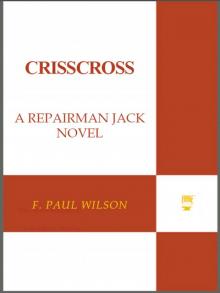 Crisscross
Crisscross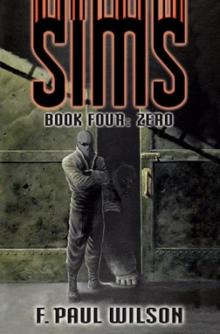 Ground Zero
Ground Zero Short Stories
Short Stories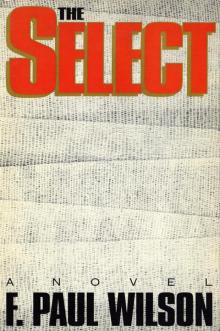 The Select
The Select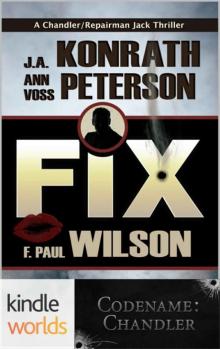 Codename
Codename Bloodline
Bloodline A Soft Barren Aftershock
A Soft Barren Aftershock The Tomb
The Tomb The Complete LaNague
The Complete LaNague The Tery
The Tery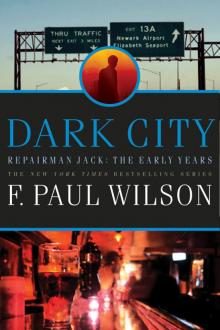 Dark City
Dark City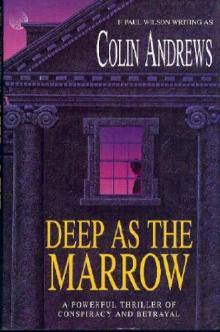 Deep as the Marrow
Deep as the Marrow The Fifth Harmonic
The Fifth Harmonic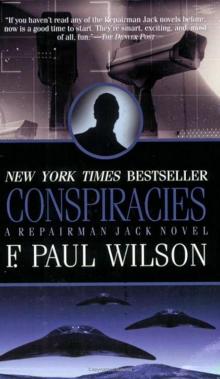 Conspiracies
Conspiracies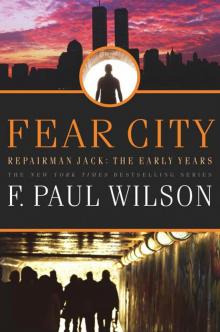 Fear City
Fear City Wheels Within Wheels
Wheels Within Wheels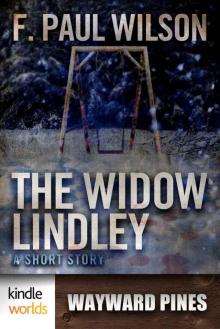 Wayward Pines
Wayward Pines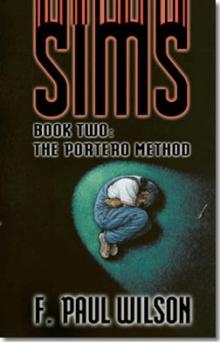 The Portero Method
The Portero Method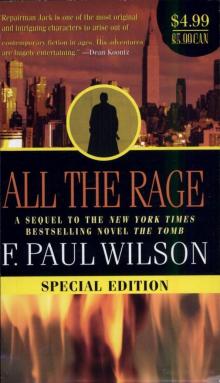 All the Rage
All the Rage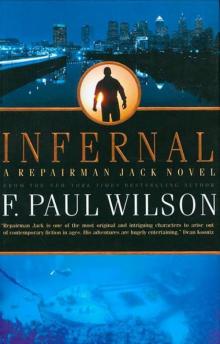 Infernal
Infernal The Barrens & Others
The Barrens & Others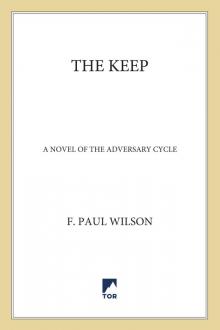 The Keep
The Keep Quick Fixes: Tales of Repairman Jack
Quick Fixes: Tales of Repairman Jack Virgin
Virgin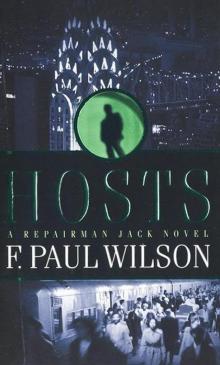 Hosts
Hosts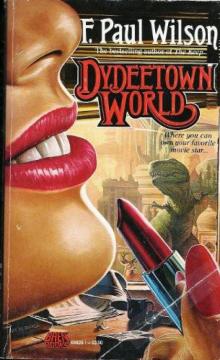 Dydeetown World
Dydeetown World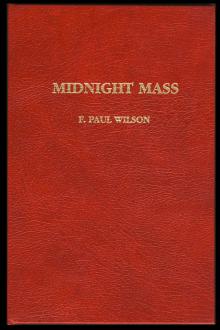 Midnight Mass
Midnight Mass Black Wind
Black Wind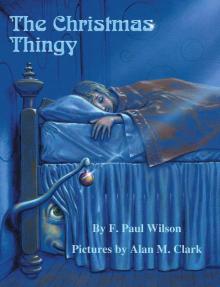 The Christmas Thingy
The Christmas Thingy The Last Rakosh
The Last Rakosh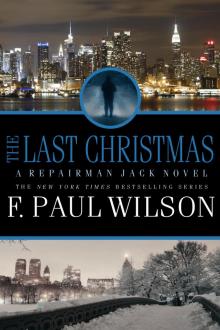 The Last Christmas: A Repairman Jack Novel
The Last Christmas: A Repairman Jack Novel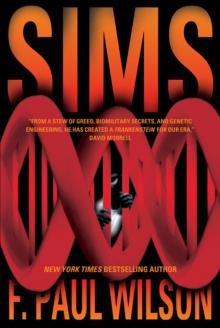 SIMS
SIMS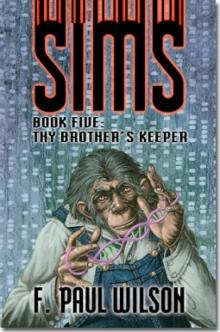 Thy Brother's Keeper
Thy Brother's Keeper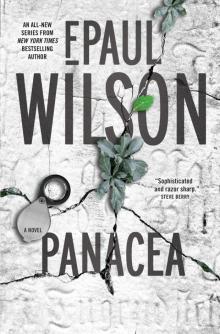 Panacea
Panacea The Touch
The Touch Scenes from the Secret History
Scenes from the Secret History Scenes From the Secret History (The Secret History of the World)
Scenes From the Secret History (The Secret History of the World)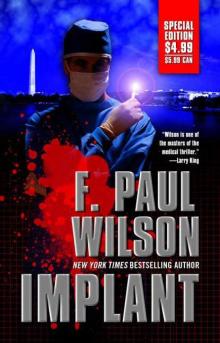 Implant
Implant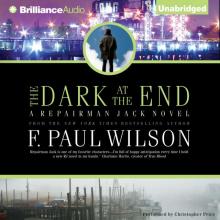 The Dark at the End
The Dark at the End Fatal Error
Fatal Error Wardenclyffe
Wardenclyffe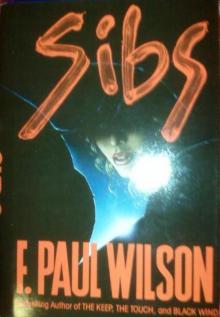 Sibs
Sibs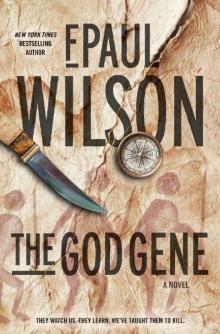 The God Gene
The God Gene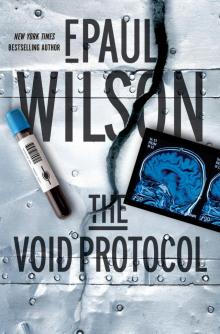 The Void Protocol
The Void Protocol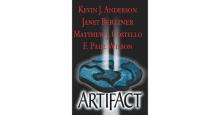 Artifact
Artifact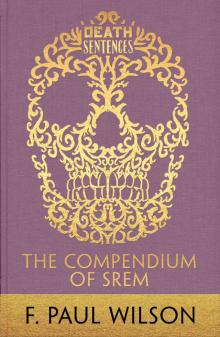 The Compendium of Srem
The Compendium of Srem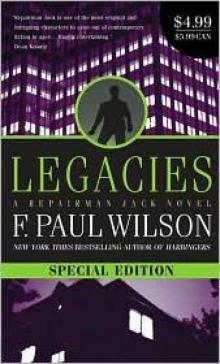 Legacies
Legacies Reprisal
Reprisal Jack: Secret Vengeance
Jack: Secret Vengeance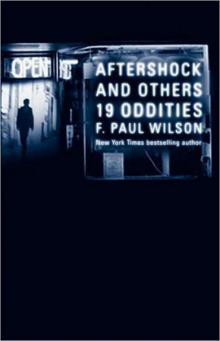 Aftershock & Others: 19 Oddities
Aftershock & Others: 19 Oddities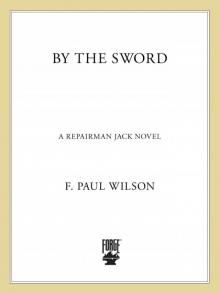 By the Sword
By the Sword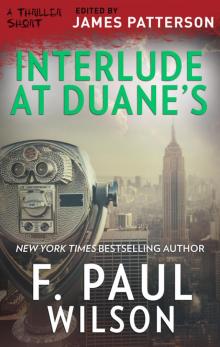 Interlude at Duane's (Thriller: Stories to Keep You Up All Night)
Interlude at Duane's (Thriller: Stories to Keep You Up All Night)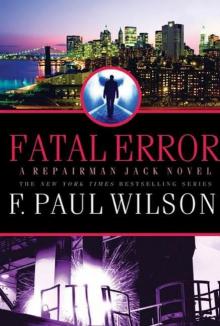 Fatal Error rj-13
Fatal Error rj-13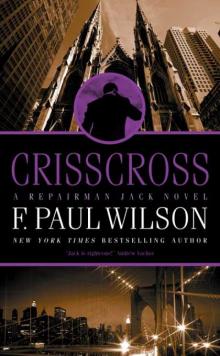 Crisscross rj-8
Crisscross rj-8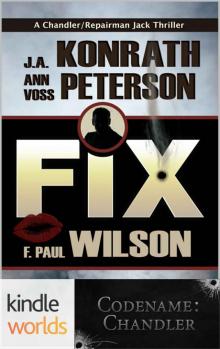 Codename: Chandler: Fix (Kindle Worlds Novella)
Codename: Chandler: Fix (Kindle Worlds Novella)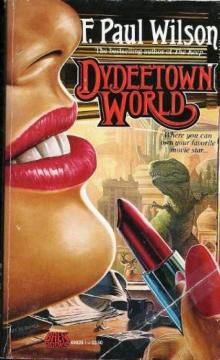 Dydeetown World lf-4
Dydeetown World lf-4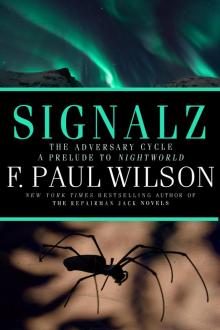 Signalz
Signalz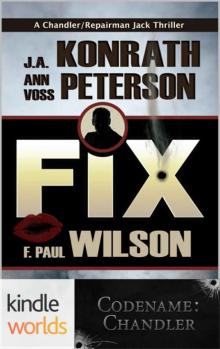 Codename_Chandler_Fix
Codename_Chandler_Fix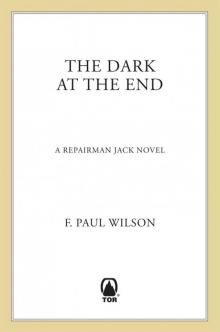 The Dark at the End (Repairman Jack)
The Dark at the End (Repairman Jack)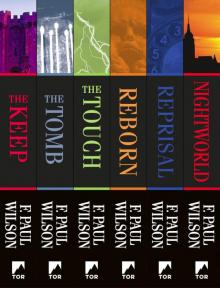 The Complete Adversary Cycle: The Keep, the Tomb, the Touch, Reborn, Reprisal, Nightworld (Adversary Cycle/Repairman Jack)
The Complete Adversary Cycle: The Keep, the Tomb, the Touch, Reborn, Reprisal, Nightworld (Adversary Cycle/Repairman Jack)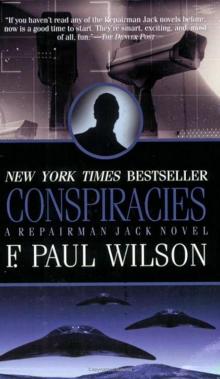 Repairman Jack 03 - Conspiracies
Repairman Jack 03 - Conspiracies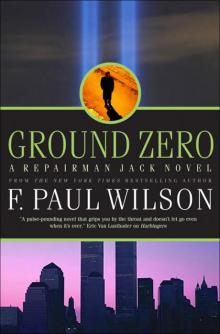 Ground Zero rj-13
Ground Zero rj-13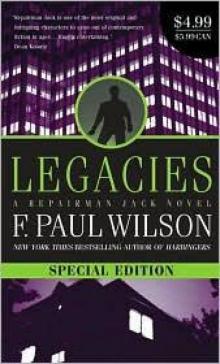 Repairman Jack 02 - Legacies
Repairman Jack 02 - Legacies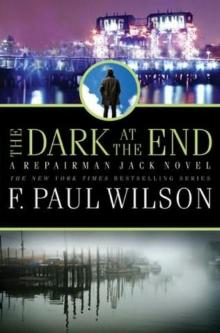 The Dark at the End rj-15
The Dark at the End rj-15![Repairman Jack [02]-Legacies Read online](http://i1.bookreadfree.com/i/03/21/repairman_jack_02-legacies_preview.jpg) Repairman Jack [02]-Legacies
Repairman Jack [02]-Legacies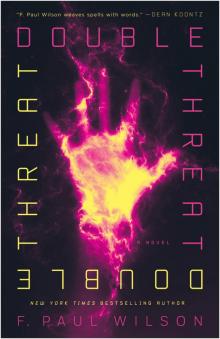 Double Threat
Double Threat The Tery lf-5
The Tery lf-5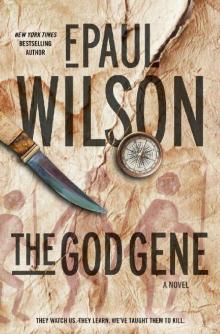 The God Gene: A Novel
The God Gene: A Novel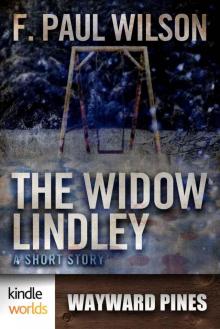 Wayward Pines: The Widow Lindley (Kindle Worlds Novella)
Wayward Pines: The Widow Lindley (Kindle Worlds Novella)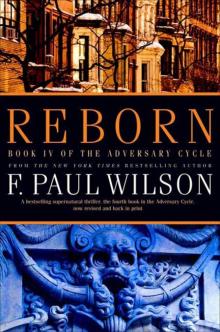 Reborn ac-4
Reborn ac-4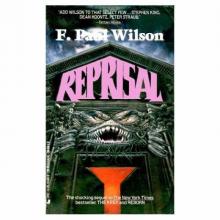 Reprisal ac-5
Reprisal ac-5 New Title 1
New Title 1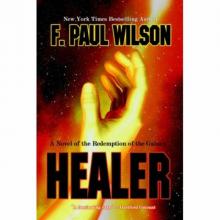 Healer lf-3
Healer lf-3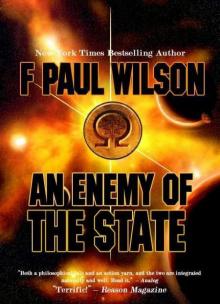 An Enemy of the State lf-1
An Enemy of the State lf-1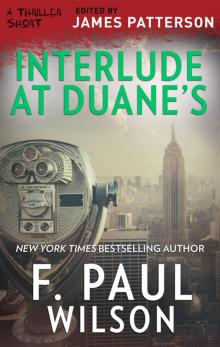 Interlude at Duane's
Interlude at Duane's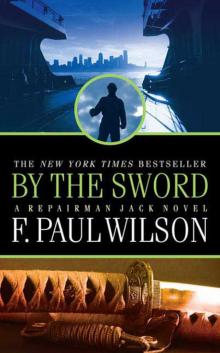 By the Sword rj-12
By the Sword rj-12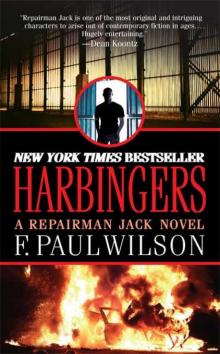 Hardbingers rj-10
Hardbingers rj-10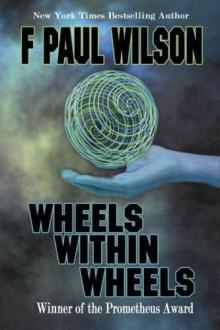 Wheels Within Wheels lf-2
Wheels Within Wheels lf-2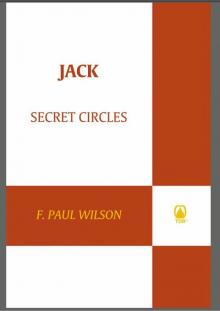 Jack: Secret Circles
Jack: Secret Circles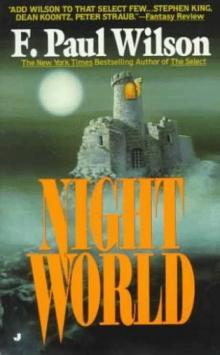 Nightworld ac-6
Nightworld ac-6 Quick Fixes - tales of Repairman Jack
Quick Fixes - tales of Repairman Jack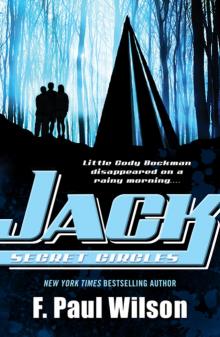 Secret Circles yrj-2
Secret Circles yrj-2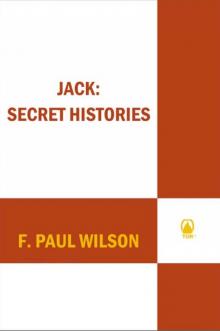 Jack: Secret Histories
Jack: Secret Histories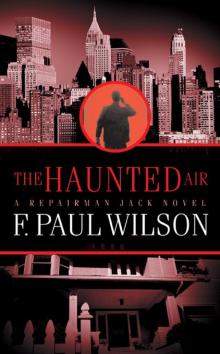 Haunted Air rj-6
Haunted Air rj-6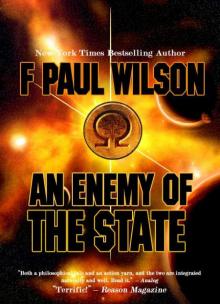 An Enemy of the State - a novel of the LaNague Federation (The LaNague Federation Series)
An Enemy of the State - a novel of the LaNague Federation (The LaNague Federation Series)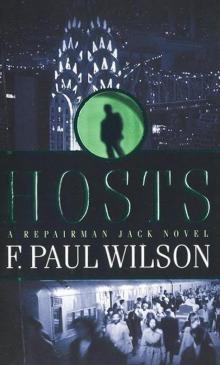 Repairman Jack 05 - Hosts
Repairman Jack 05 - Hosts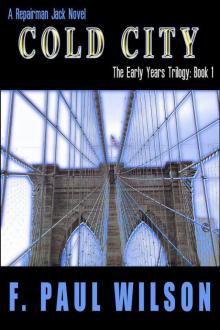 Cold City (Repairman Jack - the Early Years Trilogy)
Cold City (Repairman Jack - the Early Years Trilogy) The Peabody-Ozymandias Traveling Circus & Oddity Emporium
The Peabody-Ozymandias Traveling Circus & Oddity Emporium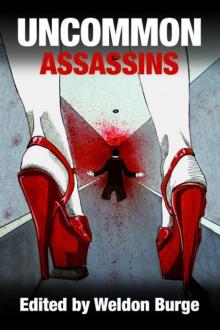 Uncommon Assassins
Uncommon Assassins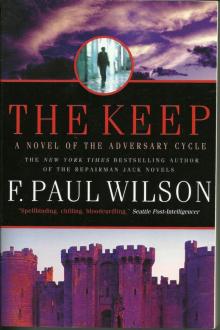 Adversary Cycle 01 - The Keep
Adversary Cycle 01 - The Keep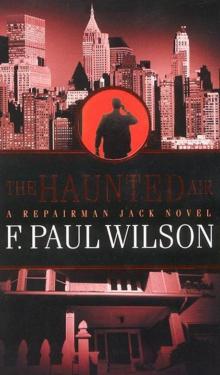 Repairman Jack 06 - The Haunted Air
Repairman Jack 06 - The Haunted Air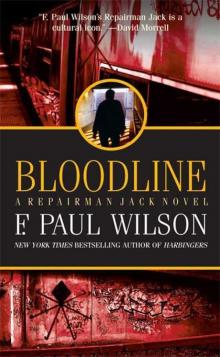 Bloodline rj-11
Bloodline rj-11 Ultimate Supernatural Horror Box Set
Ultimate Supernatural Horror Box Set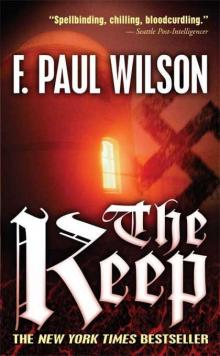 The Keep ac-1
The Keep ac-1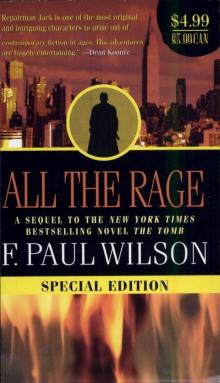 Repairman Jack 04 - All the Rage
Repairman Jack 04 - All the Rage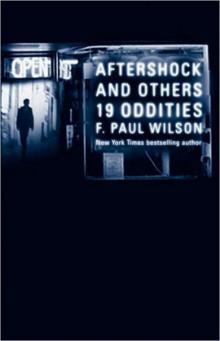 Aftershock & Others
Aftershock & Others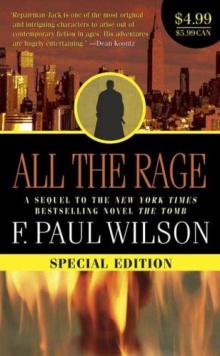 All the Rage rj-4
All the Rage rj-4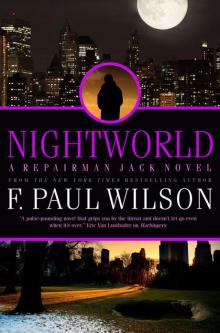 Nightworld (Adversary Cycle/Repairman Jack)
Nightworld (Adversary Cycle/Repairman Jack)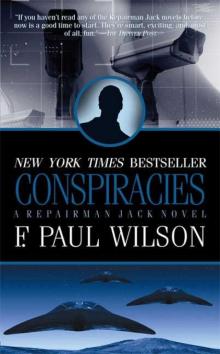 Conspircaies rj-3
Conspircaies rj-3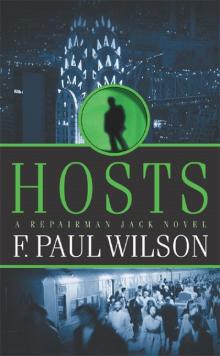 Hosts rj-5
Hosts rj-5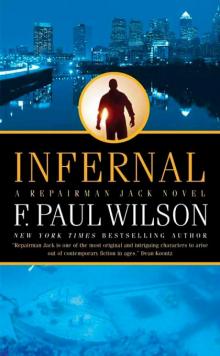 Infernal rj-9
Infernal rj-9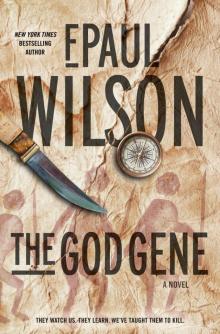 The God Gene: A Novel (The ICE Sequence)
The God Gene: A Novel (The ICE Sequence)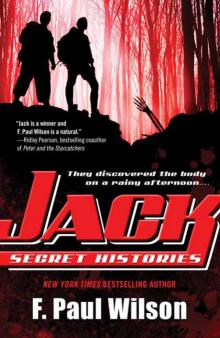 Secret Histories yrj-1
Secret Histories yrj-1